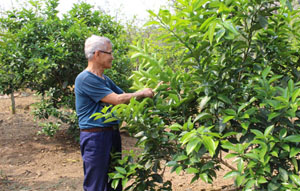


The commune is now home to 35 revolutionary contributors, including families of 10 martyrs, 10 Agent Orange (AO)/dioxin victims, 8 war invalids, 2 sick soldiers, among others. Living conditions of families of the revolutionary contributors have been improved, with an average income of about 50 million VND a year, higher than the local people’s per capita income of 26 million VND a year.
To well implement the movement of caring for revolutionary contributors, the local administration has deployed the Party and State’s preferential policies for revolutionary contributors and their families.
The local authorities also cooperated with associations and social organizations to grasp aspirations of the beneficiaries, thus proposing plans to timely support them when they meet difficulties.

Mr. Nguyen Huu Thu in Nam Son 1 hamlet, Thu Phong commune (Cao Phong district) was infected with toxic chemicals, but he has constantly strived to get rich.
Along with timely paying monthly allowances to the revolutionary contributors or their families, the commune always pays attention to examining their housing conditions to repair when necessary. The commune also pays for the beneficiaries’ medical care at home, grant health insurance cards and provide free medical check-ups for beneficiaries in line with regulations.
On the occasion of traditional New Year festivals, the commune disburses money from the local budget to present gifts to policy beneficiaries. In 2016, the commune raised nearly 23 million VND for the local fund and 123 workdays to support the policy beneficiaries.
Additionally, Thu Phong commune has also promoted emulation movements of economic development among families of war invalids, sick soldiers and revolutionary contributors with the hope of having more wealthy households.
To assist families of the revolutionary contributors in economic development, the Party Committee and People’s Committee of Thu Phong commune have coordinated with the community learning centre to organize 15 training courses on planting and breeding technique. During the courses, trainees were provided with techniques to plant and care for citrus fruit trees in linewith Vietnamese Good Agricultural Practices (VietGAP)standards, especially for orange trees. This is part of the efforts to maintain Geographical Indication (GI) region of Cao Phong oranges. Having accumulated experience from the training courses, many families of war invalids such as Bui Van Kinh, Bui Ngoc Thuan and Tran Anh Dang, have achieved good results in economic development, with average income of hundreds of millions VND per year.
We visited the family of Mr Nguyen Huu Thu in Nam Son 1 hamlet, Thu Phong commune. Thu joined the resistance war against the US in the Thua Thien-Hue battlefield and he was exposed to toxic chemicals. In 1976, he returned from military service and worked for the People’s Committee of Thu Phong commune. Despite his poor health, Thu and his family members have always strived to improve economic conditions. They have actively restructured crops in order to be able to reach higher income. He planted custard-apple and grapefruit trees on his 1,000-m2 garden white sugarcane on 1,000 m2 of hill land. Thanks to the State’s support policies and his tireless efforts, Thu family’s living conditions have become more and more stable.
In response to activities celebrating the 70th anniversary of War Invalids and Martyrs'Day (July 27), Thu Phong commune’s authorities have called on local people to raise funds to present gifts to revolutionary contributors and repair the commune’s monument. Local organizations and unions have also organized various activities and provide workdays in support of the policy beneficiaries.